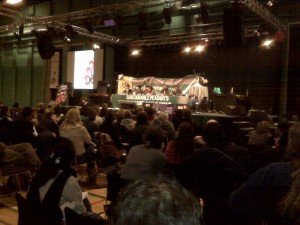It’s about 3:30 p.m. in the afternoon here – and we’re still going fairly strong with only a little sleep on the flight over.
We’re at the Klimaforum now, which is a beautiful beehive of activity with panels, discussions, people talking, eating, and milling in hallways, information on tables, walls, spilling out on to the streets, and so much more than words can adequately express.
Beyond emission reduction targets, climate financing for the global South, and the interconnections between climate justice and water justice, we are also talking about the issue of carbon offsets. I’m at a panel now that is discussing this issue.
While en route to Copenhagen I read a recent article by Jess Worth in the New Internationalist which states, “The market-based mechanisms that have been placed at the heart of the proposed treaty (in Copenhagen) by unrelenting corporate lobbying allow major polluters to ‘offset’ their emissions rather than reduce them, and generate massive profits along the way.”
Oscar Reyes writes in another article in the New Internationalist that a carbon offset scheme in the Kyoto Protocol, the Clean Development Mechanism, meant that “Northern companies could avoid having to curb their own pollution by buying ’emission reductions’ from the Global South.”
“In practice, ‘offsetting’ allows generous subsidies for existing technologies to mop up industrial gases, rather than stimulating the shift toward the low carbon world we desperately need.”
Maude Barlow has said carbon offsets “allow a company that has reduced, or appears to have reduced its carbon footprint, to sell credits to a polluter who has not. The temptation to corporate cheating and profiteering is self-evident…”
Reyes adds, “As of September 2009, three-quarters of the offset credits being traded had nothing to do with CO2 reductions. Instead, they were for large firms operating in developing countries, making minor technical adjustments to eliminate HFCs (refrigerant gases) and N20 (a by-product of synthetic fibre production). Corporations and governments in the North then buy these credits to avoid taking action domestically.”
The Council of Canadians believes that the Harper government must oppose proposals for new and expanded offsetting schemes in Copenhagen.
We’ll have much more on this in the coming days.
More analysis on carbon offsets is also in our background paper at http://www.canadians.org/energy/documents/Copbackground.pdf



